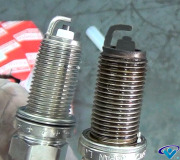Carbon monoxide failures indicate an overly rich fuel mixture. On older carbureted engines without electronic feedback controls, look for things like a stuck choke, misadjusted or fuel saturated float or a rich idle mixture adjustment. On newer vehicles with electronic carburetors or fuel injection, the system may not be going into closed loop because of a bad coolant or oxygen sensor.
Engine and/or converter not at operating temperature. If a vehicle is only driven a short distance to the test facility, it may not be warm enough for the engine to be at normal operating temperature and/or the converter at light-off temperature. This will affect the emissions of the engine and may cause it to fail. Excessive idling while waiting in a test lane may also cause the catalytic converter and/or oxygen sensor to cool down enough where they may not control emissions properly causing higher than normal readings.
Idle speed too high. A few hundred rpm can sometimes make the difference between passing and failing an emissions test if emissions are marginal.
Dirty air filter. A restricted air filter will choke off the engines air supply, causing higher than normal CO readings.
Worn or dirty spark plugs. Excessive plug gap and fouling deposits can create ignition misfire resulting in excessive HC emissions.
Dirty oil. The oil in the crankcase can become badly contaminated with gasoline if a vehicle has been subject to a lot of short trip driving, especially during cold weather. These vapors can siphon back through the PCV system and cause elevated CO readings.
Pattern failures. Some vehicles tend to be dirtier than others for a given model year because that is the way they were built. It may be the design of the engine, or the calibration of the fuel or engine control system. These kinds of problems may require special "fixes" that can only be found in factory technical service bulletins
Wednesday, November 7th, 2007 AT 3:46 AM




